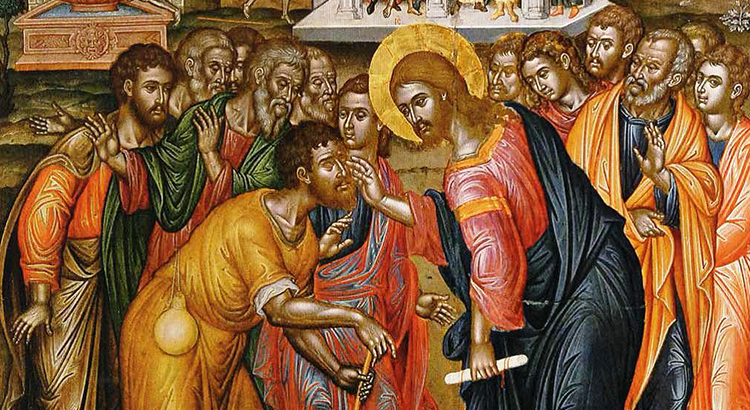Prayer for the sick
The prayer for the sick is held in the Basilica of Santa Maria in Trastevere.
Reading of the Word of God
Alleluia, alleluia, alleluia
This is the Gospel of the poor,
liberation for the imprisoned,
sight for the blind,
freedom for the oppressed.
Alleluia, alleluia, alleluia
Matthew 14,13-21
When Jesus received this news he withdrew by boat to a lonely place where they could be by themselves. But the crowds heard of this and, leaving the towns, went after him on foot. So as he stepped ashore he saw a large crowd; and he took pity on them and healed their sick. When evening came, the disciples went to him and said, 'This is a lonely place, and time has slipped by; so send the people away, and they can go to the villages to buy themselves some food.' Jesus replied, 'There is no need for them to go: give them something to eat yourselves.' But they answered, 'All we have with us is five loaves and two fish.' So he said, 'Bring them here to me.' He gave orders that the people were to sit down on the grass; then he took the five loaves and the two fish, raised his eyes to heaven and said the blessing. And breaking the loaves he handed them to his disciples, who gave them to the crowds. They all ate as much as they wanted, and they collected the scraps left over, twelve baskets full. Now about five thousand men had eaten, to say nothing of women and children.
Alleluia, alleluia, alleluia
The Son of Man came to serve,
whoever wants to be great
should become servant of all.
Alleluia, alleluia, alleluia
Let us reflect more on the multiplication of the loaves, as presented to us in the Gospel of Matthew. It begins with the notation of Jesus who, after learning the news of the death of the Baptist, wants to withdraw to a deserted place. The desert is the place of trial and prayer. The crowds, having heard the news, preceded him. And the desert also becomes the place of hunger. We think of the growing number of poor and lonely people, the countless line of those fleeing wars and hunger and those seeking a more serene future. The evangelist notes that it was a deserted place, but perhaps more than a physical desert - so much so that he then speaks of the grass - the intention is to emphasize the absence of love, solidarity and peace that makes our cities like a desert, like impossible places to live well. It is for these crowds living in deserted places that Jesus "had compassion." The disciples also have a feeling of compassion, so much so that they suggest to Jesus to send the people away since they were in a deserted place, and it was now evening. This is a more than reasonable remark: "This is a deserted place," they say to Jesus, "and the hour is now late; send the crowds away so that they may go into the villages and buy food for themselves." However, this compassion of the disciples was marked by resignation. And many times, we too are resigned to the present condition, thinking that it is impossible to change the ordinary course of things. For Jesus it is not so: "They need not to go away; you give them something to eat." The Lord is well aware that there is little in the disciples' hands: barely five loaves and two fish. But he calls them anyway to meet the need of the crowd. Jesus knows well that it is not the natural gifts of the disciples that perform the miracle. The Lord performs the miracle provided we place our trust in his hands, namely those few loaves and fishes we have. In fact, the Lord multiplies our energy, our strength if we put our trust in him.
